Working Through Your Grief
The loss of a pregnancy or infant is a traumatic event that can leave you feeling empty, confused, and full of emotions that you don’t know how to cope with. Below, we will explore 5 of the most common stages of grief. Keep in mind that grieving is an individual process—there is no right or wrong way to do it. The order of the stages, and how long it takes to work through each one, will vary from person to person. It is not uncommon to revisit the stages in the years to come, particularly when you are nearing important dates or milestones. Allowing yourself to move through the grieving process is a gift—don’t deny yourself the opportunity to feel your emotions and appropriately work through them.
Social connections with those who understand how you are feeling can be a very helpful tool in working through your grief. Utah Share can help facilitate those social connections through support meetings and Facebook groups. Do not hesitate to seek professional help if you feel as though you cannot move through the stages of grief without additional guidance.
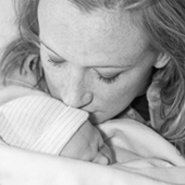 Denial
Denial
This stage includes feelings of shock, numbness, and disbelief. It acts as a defense mechanism to protect you from the immediate shock of the situation. During the “denial” stage, you might feel inclined to tell your story over and over, which enables you to grasp that your loss is real. As your mind clears and the reality of your loss settles in, you might begin asking questions such as “Why?” or “How did this happen?”
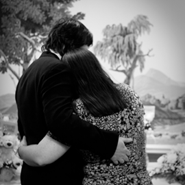
Anger
This can be a difficult stage of grief to work through, both for you and those you are close to. Your anger will probably be directed at a variety of targets—toward your loved ones, yourself, your doctor, God, or the world in general. Those who struggle to express anger outwardly might begin to internalize their anger as guilt, feeling as though they didn’t do enough to prevent the loss. Others might find themselves lashing out. Even though it can be a difficult emotion to embrace, allowing yourself to feel anger and express it appropriately will help you work through this natural and normal response to loss.
 Bargaining
Bargaining
This stage brings with it a longing for life to be back to the way it used to be. You find yourself overwhelmed with feelings of “If only…” and wishing you could go back and change things so that your baby would still be here with you. Bargaining is a coping mechanism that keeps your thoughts in the past so that you don’t have to deal with your current emotions. It is often used as a way to “make a deal” with God or a higher power in an attempt to postpone the inevitable task you have of working through your grief.
 Depression
Depression
As your grieving continues, you will begin to experience your emotions on a deeper and more intense level. Going through the motions of each day can be physically and emotionally exhausting. Just getting out of bed takes a huge effort. Your friends and family might be inclined to help your hurry through this stage, encouraging you to cheer up and carry on with life. It is important for them to know that grief-related depression is not a mental illness—it is a natural response to loss. It is bereavement and mourning and is necessary for healing. It accompanies you wherever you go. Be patient with yourself as you work through this stage. It is often the longest stage and has no set time limit to get through.
 Acceptance
Acceptance
Eventually you will move into the acceptance stage of grief. It is often mistaken as being “cured” or “over it”, which isn’t the case at all. Your loss is a part of you forever. You will always miss your baby. When you reach the stage of acceptance, you are ready to pick up the pieces of your loss and try to move on. You are settling into your “new normal”—a life where the memory of your baby is still with you even though he or she is not physically here anymore. Reaching the acceptance phase does not mean that you won’t experience waves of grief anymore, or that you won’t occasionally revisit other stages of grief, but it does mean that you are healing.
Recommended Reading
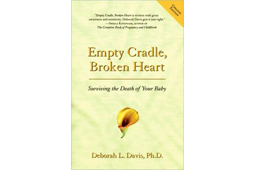 Empty Cradle, Broken Heart: Surviving the Death of Your Baby
Empty Cradle, Broken Heart: Surviving the Death of Your Baby
by Deborah L. Davis
 Tear Soup
Tear Soup
by Pat Schweibert and Chuck DeKlyen
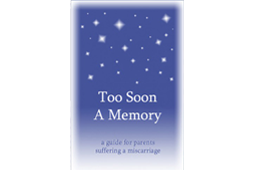 Too Soon a Memory: A Guide for Parents Suffering a Miscarriage
Too Soon a Memory: A Guide for Parents Suffering a Miscarriageby Pat Schweibert
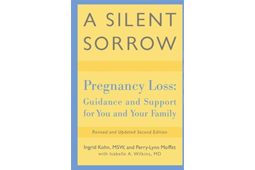 A Silent Sorrow: Pregnancy Loss: Guidance Support for You and Your Family
A Silent Sorrow: Pregnancy Loss: Guidance Support for You and Your Family
by Ingrid Kohn and Perry-Lynn Moffitt

